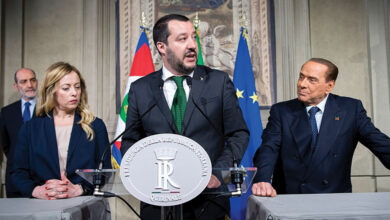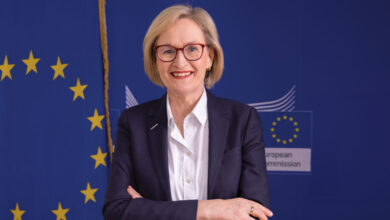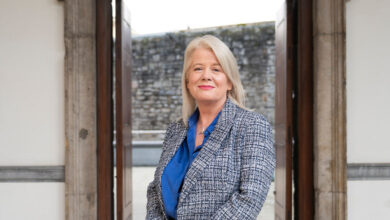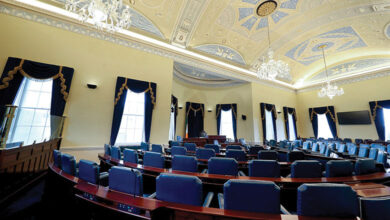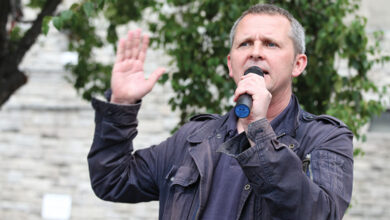Sinn Féin in the Seanad
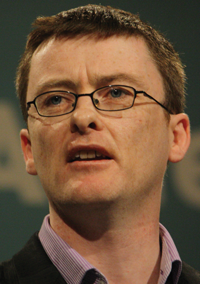 Sinn Féin will take a seat in any chamber on the island in order to transmit the republican message, Senator David Cullinane tells Meadhbh Monahan. He discusses Seanad reform and his ambitions to become a TD.
Sinn Féin will take a seat in any chamber on the island in order to transmit the republican message, Senator David Cullinane tells Meadhbh Monahan. He discusses Seanad reform and his ambitions to become a TD.
Political reform is high on Senator David Cullinane’s agenda. Sinn Féin’s leader in the Seanad was nominated to the labour panel following the 2011 general election and is joined by Kathryn Reilly on the industrial and commercial panel and Trevor Ó Clochartaigh on the agricultural panel. Pearse Doherty was the party’s only representative in the last Seanad. Contrary to popular belief that Doherty’s 2007 nomination was Sinn Féin’s first Seanad seat, the party had senators in each Seanad from the second (Gearóid O’Sullivan and Daniel Corkery, April to July, 1938) to the seventh (Daniel Corkery and Daniel O’Rourke, August 1951 to July 1954).
While Sinn Féin is opposed to the Seanad in its current form, it believes “there is room for a second chamber.” The Government should not have announced a referendum only offering the options of status-quo or abolishing it, Cullinane believes. Instead, a referendum should offer the choice of a “truly democratic” and reformed Seanad.
The Constitutional Convention is designed to engage with civic society on reform, therefore he believes that this would have been “a more effective way to engage with society to gauge if there is a mood for a second chamber.”
Sinn Féin supports reforms such as electing senators by universal suffrage and extending the franchise for its elections to people in Northern Ireland and to Irish citizens living abroad. It believes that, traditionally, the larger parties have viewed the Seanad as a means of consolidating their domination of Irish politics.
A Fianna Fáil motion in the Seanad, calling for its reform to be debated in the Constitutional Convention was passed 26-23 on 20 June when three Labour senators voted against the Government. While an embarrassment to the coalition, the Taoiseach has insisted that Seanad reform is outside the scope of the convention because the Programme for Government has already pledged to hold a referendum on its abolition.
Extra representation
When asked why he stands in a chamber that he believes is undemocratic, Cullinane contends that it remains an important forum for scrutinising legislation. However, because of the large Government majority in both the Seanad and the Dáil, “they don’t take into consideration any amendments by the opposition.”
Cullinane further justifies the party’s decision to contest Seanad elections, saying: “If there was an opportunity for Sinn Féin to gain extra Oireachtas representation at a time when the Government had such a big majority, we were going to take that and use it to maximum effect.”
He points out that Sinn Féin has difficulty with how local government is structured and financed “but we still take our seats on local authorities.” Similarly, members want to see Dáil reform but take their seats. He continues: “You take up your seat but can still have a difference of opinion as to how it works so I don’t think there is any contradiction.”
The fact that 39.7 per cent of voters rejected the Stability Treaty “shows that [Sinn Féin are] relevant and that smaller parties are getting bigger,” Cullinane states. He thinks that those voices would not have been heard in the Seanad if Sinn Féin were not present. “There is a responsibility for us to take our seats in whatever chamber and make sure the republican and Sinn Féin message gets out there,” he insists.
He dismisses the Westminster seat, saying: “As Irish republicans we have no interest in taking a seat in the British Parliament.”
Sinn Féin’s priorities for the Seanad are to build support for its policies, particularly on jobs, finance, health and education, and to make sure that “as legislators, we vindicate citizens’ rights and put in place legislation that delivers those rights.”
In reality, senators have limited powers to influence legislation and, with such few numbers, Sinn Féin is only entitled to one private member’s Bill per year. On 5 October 2011, Cullinane’s motion for presidential voting rights for northern and overseas visitors and citizens was passed 23-14. The Taoiseach has said that this matter will be considered in the Constitutional Convention.
While senators do not have constituencies, Cullinane admits that because he has Dáil ambitions, “obviously there is a focus on Waterford.” Ultimately, he wants to develop Waterford City economically to ensure it is “the engine for the south-east.”
United Ireland
“Building a new republic, a united Ireland [and] ensuring the equality agenda is centre-stage” are important, he adds.
When asked how important a united Ireland is to Irish people who are struggling with day-to-day living, Cullinane responds: “People are obviously focused on what’s happening now. There is massive austerity and social difficulties in this state. But we have to continue to make big arguments such as that an all-island economy makes sense.” Sinn Fein will “keep making the argument for a united Ireland for economic reasons, not for any romantic ideal.”
Cullinane argues that “there’s growing recognition from unionists of the need for North/South co-operation.” In his maiden speech, he commented: “I believe it was remiss on the part of the Taoiseach not to nominate to the Seanad someone from the unionist community in the North.” However, the DUP has blocked meaningful North/South co-operation to date.
The party has been accused of having a twin-track narrative by implementing austerity in the North while opposing it in the South. This is “a media-driven thing and it’s coming from the political opposition to attempt to try and confuse the electorate,” Cullinane claims.

